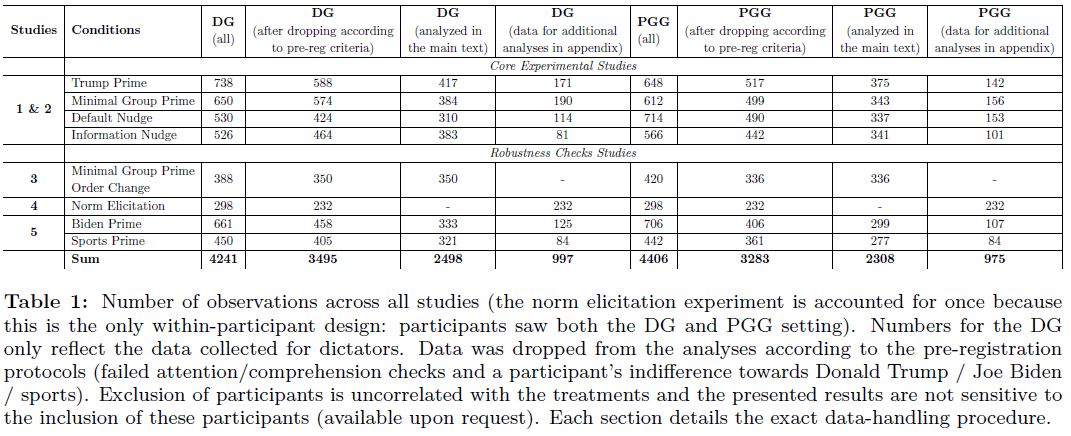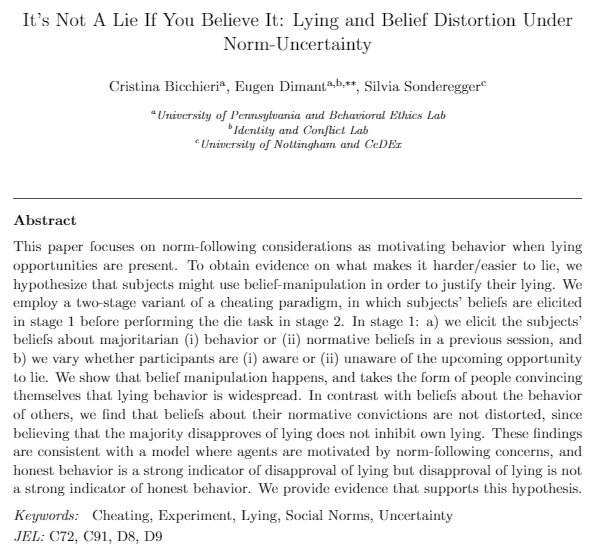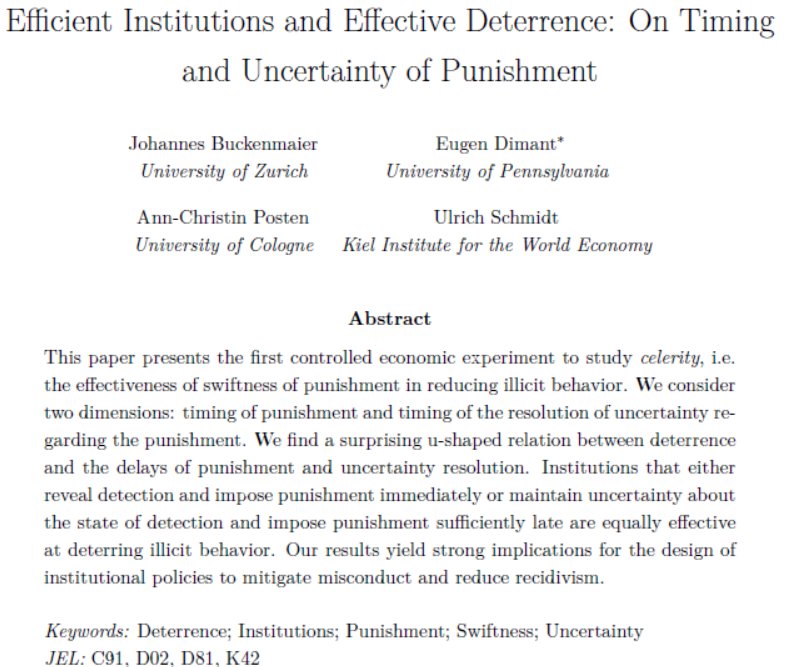
☢️New @CESifoGroup WP☢️
⦿I quantify impact of political polarization on social preferences via 15(!) incentive-compatible experiments
⦿I also test if #nudging can reduce polarization (it can't)
Paper: cesifo.org/en/publikation…
#EconTwitter
Short🧵on what's new in this version
⦿I quantify impact of political polarization on social preferences via 15(!) incentive-compatible experiments
⦿I also test if #nudging can reduce polarization (it can't)
Paper: cesifo.org/en/publikation…
#EconTwitter
Short🧵on what's new in this version
https://twitter.com/eugen_dimant/status/1301979333591003138

1/7
1st of all, the paper contains many experiments and interventions. After the initial submission of this paper, reviewers asked to not only quantify the detrimental impact of polarization but also test behavioral interventions to alleviate it.
So now I have ~9,000 obs.
1st of all, the paper contains many experiments and interventions. After the initial submission of this paper, reviewers asked to not only quantify the detrimental impact of polarization but also test behavioral interventions to alleviate it.
So now I have ~9,000 obs.
2/7
Quick recap: the 15 experiments capture
⦿ altruism & anti-social behavior (List 2007)
⦿ cooperativeness & trust (Fischbacher et al 2001)
⦿ norms (Krupka & Weber 2013)
⦿ behavioral interventions (defaults & norm-nudges, @shlomobenartzi @R_Thaler @CassSunstein @CBicchieri)
Quick recap: the 15 experiments capture
⦿ altruism & anti-social behavior (List 2007)
⦿ cooperativeness & trust (Fischbacher et al 2001)
⦿ norms (Krupka & Weber 2013)
⦿ behavioral interventions (defaults & norm-nudges, @shlomobenartzi @R_Thaler @CassSunstein @CBicchieri)

3/7
⦿This paper is the 1st to test whether nudging can reduce political polarization in the U.S. wrt altruism & cooperativeness
⦿Results suggest: polarization runs too deep & that structural - ontop of behavioral - interventions are needed @R_Thaler @CassSunstein @katy_milkman
⦿This paper is the 1st to test whether nudging can reduce political polarization in the U.S. wrt altruism & cooperativeness
⦿Results suggest: polarization runs too deep & that structural - ontop of behavioral - interventions are needed @R_Thaler @CassSunstein @katy_milkman
4/7
Design: across all experiments, the experiments are quite simple. Participants are
⦿ asked about their opinion regarding Trump/Biden/sports/minimal group markers
⦿ randomly matched with another participant for whom the relevant identity is either the same or opposite

Design: across all experiments, the experiments are quite simple. Participants are
⦿ asked about their opinion regarding Trump/Biden/sports/minimal group markers
⦿ randomly matched with another participant for whom the relevant identity is either the same or opposite


5/7
In the 1st public version of the paper, I had established that:
⦿ detrimental impact of polarization on social preferences runs deep
⦿ failure to cooperate driven by misguided beliefs about how others & not by categorical unwillingness to cooperate
@ylelkes @d_f_stone

In the 1st public version of the paper, I had established that:
⦿ detrimental impact of polarization on social preferences runs deep
⦿ failure to cooperate driven by misguided beliefs about how others & not by categorical unwillingness to cooperate
@ylelkes @d_f_stone


6/7
🔥new nudging results🔥
⦿ tested 2 nudges (pro-social/cooperative by default or learning descriptive norms about previous behavior)
⦿ nudging shifts behavior upwards but is *unable* to reduce polarization gap
➡️participants still discriminate against political outgroups



🔥new nudging results🔥
⦿ tested 2 nudges (pro-social/cooperative by default or learning descriptive norms about previous behavior)
⦿ nudging shifts behavior upwards but is *unable* to reduce polarization gap
➡️participants still discriminate against political outgroups




7/7
Thankful for having received valuable feedback from @yanchen @BrendanNyhan @pylekeyton @c_a_gravert @Leesplez & many more (incl my @UoNCeDEx friends S. Gächter, D. Nosenzo & S. Sonderegger).
Details on the previous results are in the old tweet below
Thankful for having received valuable feedback from @yanchen @BrendanNyhan @pylekeyton @c_a_gravert @Leesplez & many more (incl my @UoNCeDEx friends S. Gächter, D. Nosenzo & S. Sonderegger).
Details on the previous results are in the old tweet below
https://twitter.com/eugen_dimant/status/1301979333591003138?s=20
• • •
Missing some Tweet in this thread? You can try to
force a refresh






